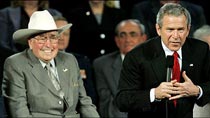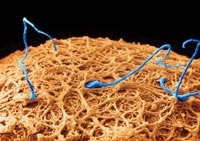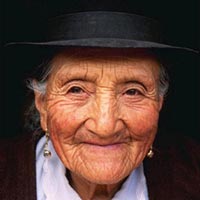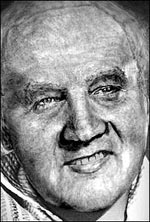| (insert your NIE or newspaper logo here) | Weekly Online LessonOnline Lesson ArchiveGrade Level: 6-8
|
Aging Well
 In
his State of the Union address on Wednesday, February 2, 2005, President
George W. Bush launched his big push for changing a 70-year-old law
-- the Social Security Act.
In
his State of the Union address on Wednesday, February 2, 2005, President
George W. Bush launched his big push for changing a 70-year-old law
-- the Social Security Act.
According to the Bush Administration's calculations, by 2018, Social Security will owe more in annual benefits than the revenues it takes in. That means, when today's young workers begin to retire in 2042, the system will go bankrupt.
As the system stands, monthly Social Security checks go to the elderly to help them with living expenses. These checks are paid for by the people who are currently working. Because the "baby boom" generation (born right after World War II) is so large, about 33 million people, the working population may not be able to sustain the current system beyond the next decade or two.
To "fix" the system, President Bush is proposing that the government allow young workers to divert part of their payroll taxes into private investment accounts. Basically, the plan would shift the primary responsibility of elderly care from the government to the individual.
 Prior
to the turn of the 20th century, the majority of people in the United
States lived and worked on farms and the elderly were generally taken
care of by the extended family.
Prior
to the turn of the 20th century, the majority of people in the United
States lived and worked on farms and the elderly were generally taken
care of by the extended family.
However, this trend changed as America underwent the Industrial Revolution. The extended family and the family farm as sources of economic security became less common. Then, the Great Depression triggered a crisis in the nation's economic life. These events are what prompted the American government to create the Social Security Act.
Other politicians and citizens believe there are other, possibly better, options than the Bush plan that should be explored. Heated debates over the issue are likely to continue for months.
Resolving how to care for our nation's elderly is a critical task, since aging is inevitable and typically brings on new health problems, as well as social and economic challenges.
For this week's lesson, you're going to learn about how human biology changes over a lifetime. Then, you'll explore some of the secrets of aging.
Your Life Cycle
 Let's
begin your journey at the Science Museum in the UK to check out Your
Life Cycle.
Let's
begin your journey at the Science Museum in the UK to check out Your
Life Cycle.
Read the introduction, then move through the site beginning with Your Body Plan. Use the navigation on the right-hand side to discover how you become A New Person,
You'll find out how Genes and the embryo work, as well as the Regulating genes. What's important about protein, and how does it get made?
Next, learn about How the embryo develops. In this section, you'll discover what happens In the beginning, and how our cells determine the Front and back, Which way up?, and Left and right side.
How exactly do our cells figure out which orientation to take? Why is this process important to our development?
Now the question is, Which cells do what? How do they function in Shaping our body? How exactly is Dividing up the body determined? What are Hox genes?
As your body deals with those "decisions," it also works on What sex you'll be and Adding organs and limbs.
Why do you think many Animal body plans are similar? How do cells know what to do?
Now that we know how we grow into a person, let's find out about Ageing (an alternative spelling for "aging") to explore the question, How long will you live?
 What
factors have helped humans have longer life spans? How might a person
have A
100-year life? Who have been some of The
world's oldest people?
What
factors have helped humans have longer life spans? How might a person
have A
100-year life? Who have been some of The
world's oldest people?
So What happens when you age?, and What makes you age?
What damages your cells? What role does glucose play in this process? Why would consuming fewer calories as you get older help you to live longer?
You've now learned a lot about how cells grow and what different cells do, but How does a cell know how old it is? How does Telomerase affect cells?
Okay, so aging has so far been unavoidable, but Can you prevent ageing? Could injecting hormones do the trick? How can an individual's lifestyle choices related to nutrition, exercise, stress management, etc. influence how long a person's longevity?
Everyone eventually dies, but why? Why don't we live forever? In what ways do genes influence our life span?
If you have time, also explore the sections titled, Egg to Birth, Cancer, Immunity, and What do your cells do?
The Secrets of Aging
 Now,
that you understand the basics of our life cycle, let's take an in-depth
look into the Secrets
of Aging, starting with the Body
and How
our bodies age.
Now,
that you understand the basics of our life cycle, let's take an in-depth
look into the Secrets
of Aging, starting with the Body
and How
our bodies age.
Here, you'll read about the different ways scientists study human aging. Also, read hear from Betty Friedan and Maya Angelou about how being older is different from being younger.
At the bottom of the page, explore some of the researchers' findings related to How tall will I be when I get older?, How do you cope with stress?, and The Three Martini Lunch test.
Next, let's make a stop at the Age Defying Store (Shockwave Player required). Which items would be most important to you? Do the results of scientific studies influence your choices at all? Do you know anyone that uses these types of products?
Also, read about how other people defy aging. What kinds of choices do people around you make to help keep them healthy as they age?
 Lastly
in this section, Face
aging and watch several children grow older in cyber-time.
Have you noticed similar changes, based on photographs taken of friends
or family when they were younger?
Lastly
in this section, Face
aging and watch several children grow older in cyber-time.
Have you noticed similar changes, based on photographs taken of friends
or family when they were younger?
Now let's explore the Mind to take the Fluid/Crystallized Intelligence Test and the Memory Test. Why is mental exercise as important as physical exercise in helping us age well?
Before leaving this section, read or listen to what Steve Allen and Art Buchwald have to say. What other ways can aging change you mentally?
Next, let's see how the elderly contribute to and interact with Society. Listen to the Future Forecast and play Aging Poker. In what ways will the population predictions affect our society as a whole? What opportunities for elderly involvement -- among other elderly and across various groups-- does your local community offer?
The last secrets to uncover here relate to Longevity. Compare the Life Span Blocks and Life Expectancy Histograms. Do any of these comparisons surprise you?
Newspaper Activities
Browse current issues of The Salt Lake Tribune, looking for any news stories or features related to elders in your local or regional community, elsewhere in the U.S. or in other parts of the world. What roles do they play in their families or communities? How are these elders being treated by younger people? Is the government doing anything to support today's and tomorrow's elderly populations? What are some of the ways people are trying to defy aging? For example, what products, exercise regimens, or medicines are being touted, and by whom?
© Copyright 2005
Learners Online, Inc.
